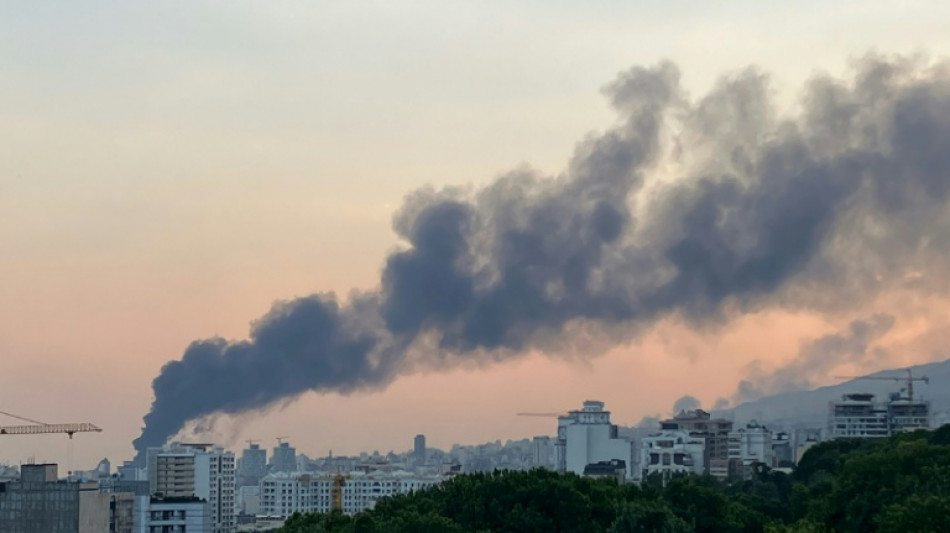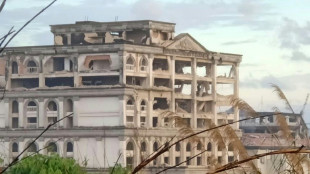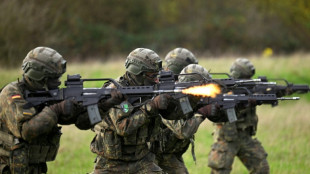

Israel, Iran trade missile fire as Trump warns Tehran to 'evacuate'
Israel and Iran traded missile fire for a fifth straight day Tuesday, as US President Donald Trump warned Tehran residents to "immediately evacuate" and left a G7 summit early.
Despite growing calls for the longtime foes to end hostilities, neither Israel nor Iran showed any signs of cutting short the missile blitz kicked off Friday, when Israel launched an unprecedented series of aerial raids targeting Iranian nuclear and military facilities.
After a new wave of Israeli strikes on Iran's capital -- including a dramatic attack on a state TV building -- both countries activated their missile defence systems overnight into Tuesday, with Israel's army briefly urging residents to seek shelter from incoming Iranian missiles.
The Chinese embassy in Tel Aviv warned its citizens to leave the country immediately, as the United States said it was deploying "additional capabilities" to the Middle East, according to Pentagon chief Pete Hegseth.
The aircraft carrier USS Nimitz departed Southeast Asia on Monday after cancelling plans to dock in Vietnam, amid reports it was headed to the Middle East to boost the US presence there.
But a White House spokesman stressed that US forces in the Middle East remained in a defensive posture, despite the flurry of activity.
Trump has repeatedly declined to say if the United States would participate in Israeli military action, although he says it was not involved in the initial strikes.
After calling on the two sides to make a deal, the US leader issued an extraordinary warning on his Truth Social platform.
"Everyone should immediately evacuate Tehran!" Trump wrote without offering further details, before cutting short his attendance at the G7 in Canada to head back to the White House.
- 'One after the other' -
After decades of enmity and a prolonged shadow war, Israel launched a surprise aerial campaign against Iran last week, with the stated aim of preventing Tehran from acquiring atomic weapons -- an ambition it denies.
Iran has launched several waves of missiles in retaliation for Israel's attacks, with Iran's Revolutionary Guards boasting Monday evening that the attacks would continue "without interruption until dawn".
The sudden flare-up has sparked fears of a wider conflict, with Trump urging Iran back to the negotiating table after Israel's attacks derailed ongoing nuclear talks.
US Ambassador to Israel Mike Huckabee said a missile strike lightly damaged a building used by the American embassy in Tel Aviv, while the US State Department warned citizens on Monday not to travel to Israel due to security concerns.
At least 24 people have been killed in Israel so far and hundreds wounded, according to the prime minister's office.
Israel's strikes have killed at least 224 people, including top military commanders, nuclear scientists and civilians, according to Iranian authorities.
Netanyahu told a press conference Monday evening that Israel was eliminating Iran's security leadership "one after the other".
"We are changing the face of the Middle East, and that can lead to radical changes inside Iran itself," he said.
- 'Stop' civilian strikes -
International calls for calm have mounted.
At the Group of Seven summit in the Canadian Rockies, leaders including Trump called Monday for "de-escalation" while stressing Israel had the right to defend itself.
"We urge that the resolution of the Iranian crisis leads to a broader de-escalation of hostilities in the Middle East, including a ceasefire in Gaza", G7 leaders said in a joint statement that also affirmed "Iran can never have a nuclear weapon".
China called on Israel and Iran to both "immediately take measures to cool down the tensions" and avoid plunging the region into deeper turmoil.
The United States and Iran had engaged in several rounds of indirect talks on Tehran's nuclear programme in recent weeks, but Iran said after the start of Israel's campaign that it would not negotiate while under attack.
Iranian Foreign Minister Abbas Araghchi said Monday that "absent a total cessation of military aggression against us, our responses will continue".
"It takes one phone call from Washington to muzzle someone like Netanyahu. That may pave the way for a return to diplomacy," he wrote on X.
A senior US official told AFP Trump had intervened to prevent Israel from carrying out an assassination of Iran's supreme leader, Ayatollah Ali Khamenei.
But Netanyahu did not rule out the possibility when asked about the reports during an interview with ABC News.
"It's not going to escalate the conflict, it's going to end the conflict," he said.
O.T.Wolf--NRZ



